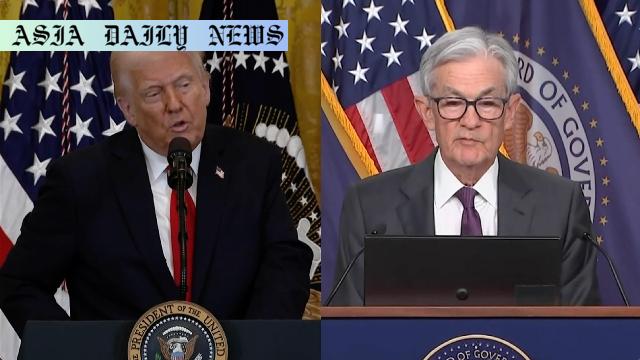Federal Reserve: Trump lashes out at Jerome Powell, stressing dissatisfaction with rate policy, claiming authority to replace him quickly.
Trump criticizes Jerome Powell for slow interest rate policies.
The President claims authority to remove the Federal Reserve Chair.
Powell defends the Fed’s independence amidst rising tensions.

Trump’s Dissatisfaction with Federal Reserve Chair Jerome Powell
US President Donald Trump has intensified his criticisms of Federal Reserve Chair Jerome Powell, accusing him of inefficiency in handling the country’s interest rate policies. Claiming that Powell is ‘too late’ and ‘too slow’ in making crucial decisions, Trump has suggested that he has the authority to remove Powell from his position if necessary. This statement comes amidst heightened tensions between the White House and the Federal Reserve, spotlighting a growing divide over monetary policy approaches.
Trump’s dissatisfaction revolves primarily around Powell’s caution in cutting interest rates, a move the president believes could stimulate economic growth amidst falling energy and commodity prices. Earlier in the month, Trump posted on social media urging Powell to act swiftly, emphasizing that delays could adversely impact the nation’s economic stability. While Powell has defended his approach as carefully measured amid unusual economic challenges, including tariff hikes, Trump’s criticisms raise questions about the independence of the Federal Reserve.
The Federal Reserve’s Approach to Monetary Policy
In response to Trump’s accusations, Powell delivered a speech clarifying the Federal Reserve’s stance and its commitment to basing monetary decisions on the economy’s real needs. According to Powell, recent tariff increases have led to greater-than-expected inflation, coupled with slower economic growth projections. These factors underscore the complexity of managing monetary policy in a volatile economic environment. Choosing to emphasize careful analysis over abrupt action, Powell has sparked a public debate over Federal Reserve’s function and the potential consequences of further rate cuts.
This conflict echoes larger concerns about political interventions in central banking, highlighting the importance of preserving institutional independence. Economists have pointed out that destabilizing the Federal Reserve could have long-term implications, putting economic stability at risk. As the debate continues, stakeholders remain divided on the ideal balance between monetary policy caution and flexibility.
The Implications of Political Pressure on Economic Decisions
Trump’s remarks reflect a growing trend of political pressure on independent institutions, particularly in times of economic uncertainty. If Trump makes good on his implicit threat, removing Powell could set a precedent for heightened executive control over central banking—a move critics warn would undermine the Federal Reserve’s credibility. Historically, such interferences have been viewed as detrimental, creating environments of financial instability and uncertainty.
Meanwhile, supporters of Trump’s stance argue that the Federal Reserve must take more proactive steps to align with the administration’s growth-oriented goals. They claim that waiting for optimal conditions before acting fails to address immediate economic concerns, such as rising inflation and trade instability. This debate underscores the need for careful negotiation between the executive branch and the Federal Reserve, in a bid to respect both political mandates and institutional independence.
A Roadmap for Resolving Conflicts
As tensions between Trump and Powell escalate, the path forward may depend on their ability to find common ground. For the Federal Reserve, articulating a clear, data-driven rationale for its decisions could help dispel criticisms of inaction. Similarly, engaging in constructive dialogue with the Trump administration could reduce the risk of future confrontations, fostering a cooperative, rather than adversarial, approach to economic governance.
However, this requires a willingness on both sides to balance short-term demands with long-term goals. For Trump, acknowledging the Federal Reserve’s autonomy could reaffirm global confidence in US financial institutions. By fostering transparency, respect, and collaboration, policymakers could mitigate the risks associated with an intensifying clash of agendas.



Commentary
The Growing Political Debate Over the Federal Reserve
The recent clash between President Donald Trump and Federal Reserve Chair Jerome Powell provides an illuminating, albeit unsettling, view into the challenges of balancing politics with independent economic governance. At the heart of this issue lies the delicate balance between presidential authority and institutional autonomy—something that has historically been pivotal for global faith in US monetary policy. Trump’s criticisms and his claims about removing Powell reveal underlying tensions regarding the scope of his power and raises larger questions about the stability of central banking.
Why Institutional Independence Matters
The Federal Reserve’s independence is not just a safeguard—it’s a cornerstone of economic credibility. If Powell were removed due to political disagreements rather than grounds of professional incompetence, it would send shockwaves through both domestic and international financial markets. Such a precedent could diminish investor confidence, aggravate market volatility, and weaken US leadership in global finances. Trump may have understandable reasons for wanting interest rates cut quickly during economic slowdowns; however, undermining the very institutions tasked with protecting long-term stability sets a dangerous precedent.
Finding Mutual Paths Toward Economic Growth
For a resolution, both Trump and Powell must prioritize collaboration over confrontation. While their roles differ, they share a common goal: economic prosperity and stability for the United States. Powell, on his part, would benefit from placing greater emphasis on publicly addressing the administration’s more immediate concerns. Meanwhile, Trump should take a step back and allow room for independent decisions, while constructively presenting his own rational concerns to the Federal Reserve.
Only through dialogue, respect, and shared purpose can they find middle ground—an outcome that would not only settle their differences but could also reinforce trust in America’s financial future.